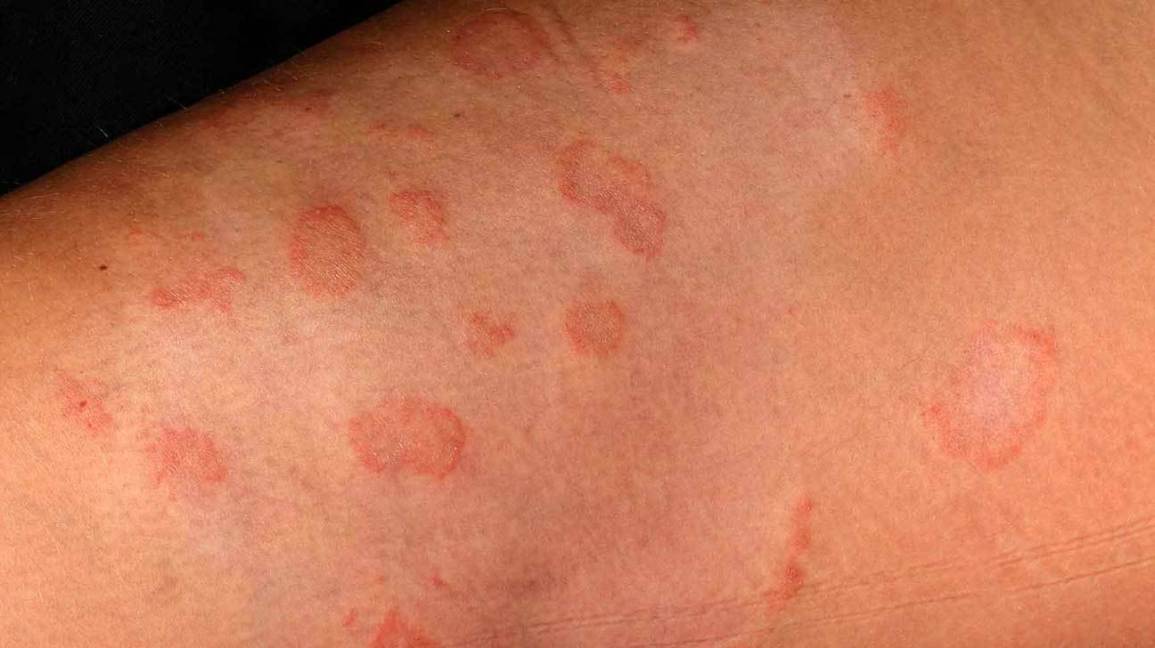Is Ringworm skin infection caused by a parasite?

No, this skin infection is not at all caused by a parasite. Ringworm, also medically known as Tinea Corporis is a type of fungal infection of the skin. It is called Ringworm due to the appearance of the skin lesions resembling a worm. It is highly contagious and spreads through skin contact. Get it checked and treated with Ringworm medicine by DoctoronCall.
Why does Ringworm skin infection happen?
You have a higher chance of contracting ringworm infection of the body if you:
- Reside in a country with a hot and humid climate.
- Have close contact with an infected person or animal.
- Sharing of personal items with an infected person especially clothing, bedding or towels.
- Always put on tight or restrictive clothing and t change your attire daily.
- Suffer from a weak immune system such as patients on chemotherapy or diabetes mellitus.
How do I know if it is a Ringworm skin infection?
Ringworm infection can be found on any part of the body:
- Tinea cruris or jock itch
- Tinea pedis or Athlete’s foot.
- Tinea capitis or ringworm infection on the scalp.
The skin lesions can appear on 1 part of the body and spread rapidly to other parts of the body. On physical examination, tinea skin infection has a characteristic slightly raised ring-shaped area with a clear centre that can expand and appears reddened or silver. The infected area causes a very severe itch. As a result of the inflammation, scale, crust, papules, vesicles, and even bullae can develop, especially in the advancing border. On the other hand, Tinea capitis cause additional symptom hair loss. If left untreated, Tinea corporis can put patients at risk of being secondarily infected with bacteria.
How does a doctor know if it is a Ringworm skin infection?
It is easily detected by the characteristic appearance of the skin lesion. On rare occasions, the doctor will take swabs from the infected area and observe the sample under the microscope for confirmation of dermatophytes or fungal growth.
What is the treatment for Ringworm skin infection?
It is easily treated with topical antifungal therapy in the form of creams, ointments or lotions containing azole group of chemicals, for instance, ketoconazole, miconazole or fluconazole depending on the severity and response to treatment. Their mechanism of action involves interfering with the cell membrane of the fungus, leading to fungal death.
Topical steroids of mild to moderate can be added for symptomatic relief. If therapy is inadequate, the infection can recur but it is not for prolonged use due to concerns of side effects from the medications. Do not attempt to obtain over-the-counter topical medications without a doctor’s prescription.
Besides that, you must also ensure your clothing, bedsheets, towels and comb or other personal items you used prior to treatment are thoroughly washed with warm water and detergent as objects in contact with infection can continue to spread or cause recurrences.
I’m afraid I will be infected again. What do I do?
You’re highly at risk of being infected again if therapy is inadequate. However, the infection can be prevented by:
- Wash towels and bedsheets regularly.
- Do not share personal items.
- Wash your hands before or after touching animals or soil.
- Take your pet to the vet if they’re suspected of having ringworm (for example, patches of missing fur).
- Wear loose-fitting clothing made of breathable material such as cotton or synthetic materials.
- Do not scratch the infected skin area as it can spread to other parts of the body.

